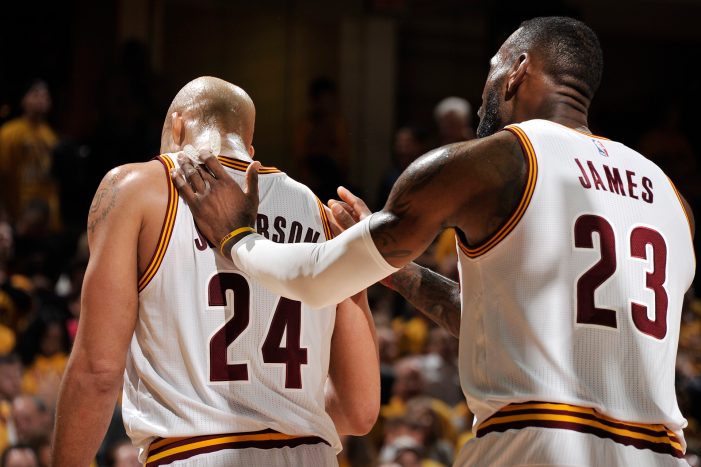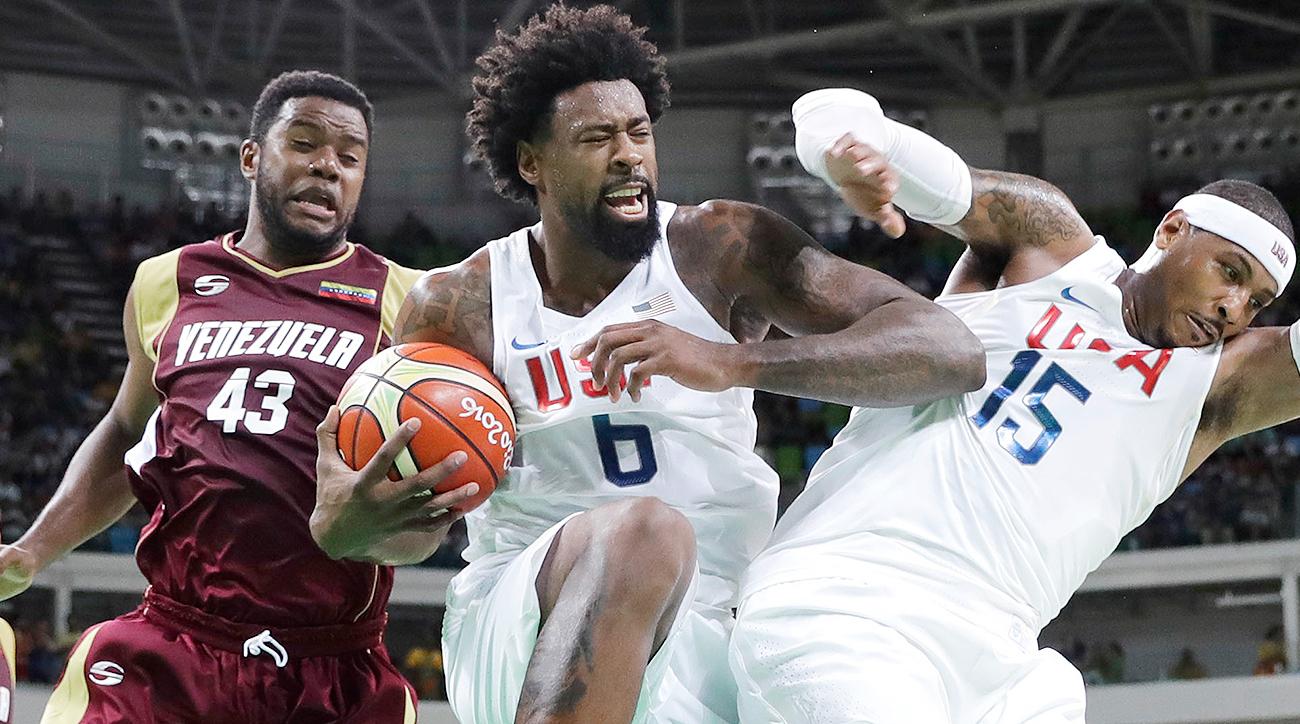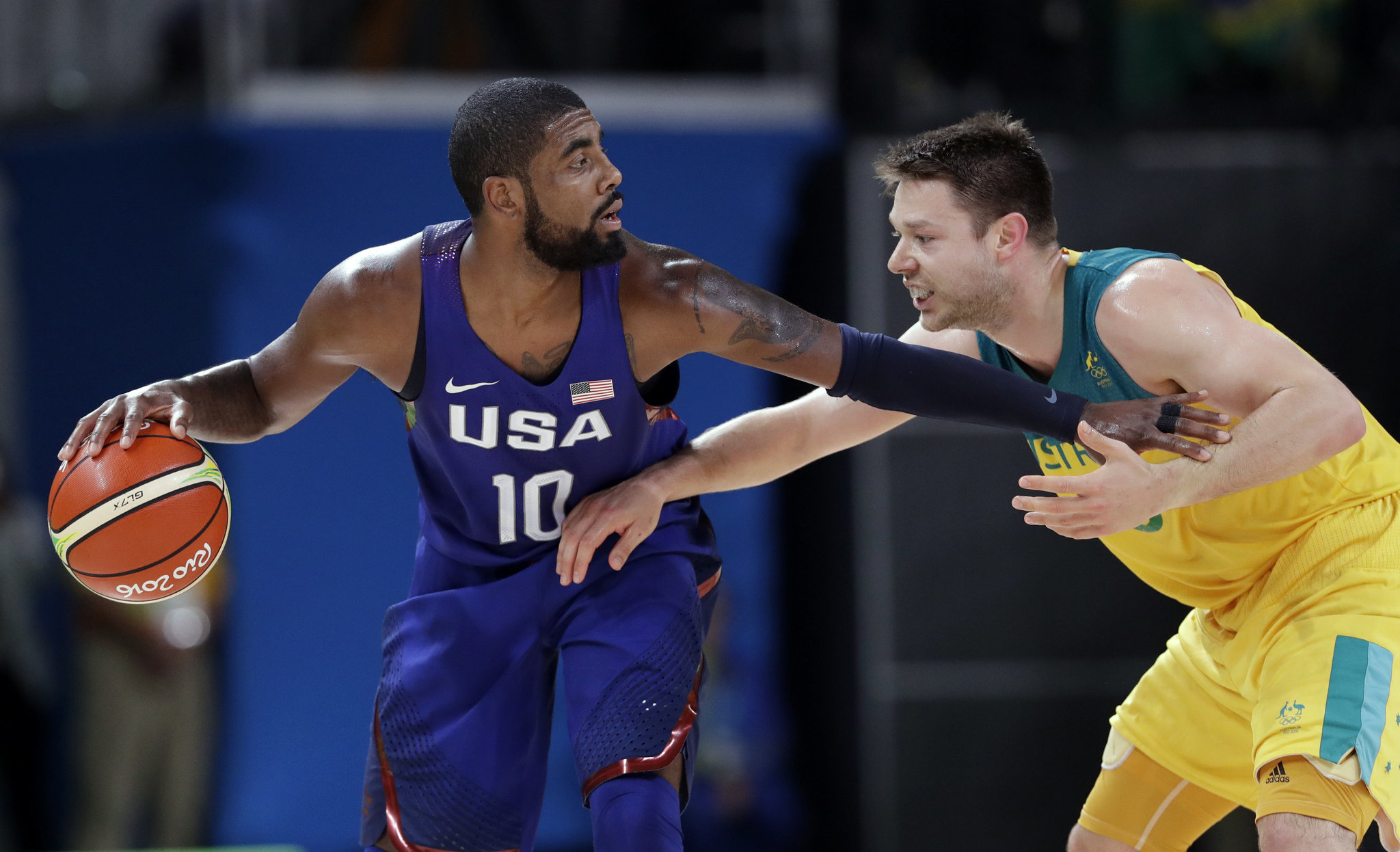
The Point Four-ward: Elder Statesmen?
2016-08-10
Four points I’m thinking about the Cleveland Cavaliers…
1.) Assuming the Cavs eventually re-sign LeBron James and J.R. Smith, Cavs GM David Griffin has done a pretty nice job strengthening the roster for next season. With no draft picks, his team already heavily into the luxury tax, and with a championship quieting any calls for a trade involving one of the Cavs’ bigger stars, Griffin watched, waited (in fact, he’s still waiting), and turned zero cap space and no picks into an intriguing rookie point guard in Kay Felder and two playable veterans, Mike Dunleavy Jr. (who should actually be more than just playable) and Chris “Birdman” Anderson.
In this off-season, Cavs got better… but they also got older and Father Time, LeBron James will be the first to remind everyone, remains the only unbeaten in pro sports.
So, how old is too old for a team to contend for a championship?
When looking at a team’s age, it’s important to not just average out the ages of all the players on the roster because not every player is equally critical to his team’s success. Some young players play fewer minutes than vets and, conversely, there are older guys who hardly even get off the pine. I came upon a stat called weighted age (WAGE) that tries to account for this. WAGE, as its name suggests, gives greater weight in calculating a team’s overall age to a player who plays more minutes.
Based on this statistic, the oldest team to ever win an NBA championship were the 1997-98 Chicago Bulls with a WAGE of 32.096. The 2013-14 San Antonio Spurs were the 10th oldest trophy winners with a WAGE of 29.617. By comparison, the 1976-77 Portland Trailblazers (they of Jack Ramsay and Bill Walton) had a WAGE of 24.199, while the 2014-15 Golden State Warriors were the eighth youngest winners at 26.393.
2.) The average WAGE for a championship winner is 28.234. Last season, the Cavs, for all the talk about James getting up there, were actually below that average at 28.08. This season, though, they’ll be using two 36-year old backup forwards in Jefferson and Dunleavy Jr., and 33-year old Mo Williams seems the most likely to take over the bulk of the minutes at backup point guard from the departed (and younger) Matthew Dellavedova.
Outside of an infusion of youth in Felder and his Summer League co-star Jordan McRae, both of whose playing time is anything but given at this point, the Cavs will tip off next season with last year’s roster mainly intact. Everyone will be another year older and wiser, but the bench options are all older as well.
Still, it’s probably not time to panic yet.
The top players in total minutes for the 1997-98 Bulls were a 34-year old Michael Jordan, followed by Dennis Rodman (36) and Ron Harper (34). The Cavs will rely on James (31), Kyrie Irving (24), Kevin Love (28 in September) and Tristan Thompson (25). So, while the Cavs are veteran-laden to be sure, they still have enough youth on the roster to balance that out.
At some point in the future, though, the team will need an infusion of quality youth. Maybe that’s Cedi Osman. Maybe that’s just Griffin’s next big challenge.
3.) With the explosion of sports coverage that began, in part, with the rise of ESPN in the 1980s and then accelerated exponentially in the decades that followed, sports fans are often presented with what amounts to an illusion of access. Because we, as readers, have access to so much more content, the reasoning goes, then we must know more about the athletes we follow than ever before.
Now, that’s partially true. Modern sports fans get to dip their ladles into a far deeper cauldron of minutiae than did fans in any previous era. But does having more information always relate to knowing something or someone any better? Plenty of old-school journalists have argued that prior to the 1980s, beat writers and the athletes they covered were more like equals. They traveled together on the same commercial flights, and it was possible for writers and the players they covered to have real relationships. This allowed the journalists to write about the players with a greater level of insight and sympathy, creating a depth of coverage — even if, compared to today, there was a relative dearth of content — over which many still mourn.
As the media’s coverage of professional sports grew, athletes no longer just saw the beat reporters they knew and had relationships with. They began to see a sea of people who, in their eyes, were mainly interested in tabloid style, build-them-up-to-knock-them-down coverage. The media members, meanwhile, began seeing players acting on the advice of their agents — thinking more and more about their personal brands and business interests. Players now traveled on private jets and no longer had the one-0n-one down time — let alone the inclination to let their guards down — around the people who were covering them.
We all know what this led to: a litany of canned responses given by athletes and reported by media members that make professional athletes seem essentially unknowable to fans.
4.) That’s what makes essays like Channing Frye‘s recent contribution to The Player’s Tribune so refreshing. Not only is “Let’s Enjoy This Wonderful French Toast” probably my favorite title of any piece of writing ever, getting to read Frye’s honest account of what winning a championship meant to him is a longer peek behind the curtain then we normally get.
When the final buzzer put an end to Game 7 of the 2016 NBA Finals, there was probably not a single fan who was thinking “Who the hell would’ve thought Channing Frye would be an NBA champion?” The only person thinking that specifically about how an NBA championship impacted Channing Frye was Channing Frye… and that’s part of the point. Despite all of the content we have about the sports and athletes we follow, thinking about what winning the championship meant for Frye — what it meant for, say, assistant coach Phil Handy or one-and-done Cav Sasha Kaun — is rarely our first instinct. We focus, as most do, on the stars. We focus on legacy. We focus on curses.
Frye’s story reminds us that every one has one… and his message — to be sure an appreciate the little moments that make one’s life special — is a great reminder to us all. Even if we don’t all get to enjoy the same free burritos that the Cavs provide for their players.



Damn Robert. Just got a chance to read this. Gotta say your point forwards are some of my favorite stuff to read in all of sports domain.
Even if Dunleavy is healthy, the Cavs did not get better this off-season. The players and team chemistry might improve, but the actual roster is not stronger. We can pretend Delly’s loss isn’t backbreaking because he didn’t get a lot of run in Finals. We can logically conclude that Lue didn’t trust him to play big minutes going forward. But, we can’t be blind to his huge contributions throughout all of last season. Delly is a steal for the Bucks. I still can’t believe his contract is so affordable in this market. I’m annoyed…. I will now go watch the… Read more »
Eh, I don’t subscribe to this Ben… They didn’t get worse. I have no doubt Delly will get an opportunity to thrive in Milwaukee under Kidd’s tutelage, but Ty wasn’t going to use him here… He will use Dunleavy and I already believe that McRae and Felder are a better 14 & 15th man then we had last year (all due respect to the Ninja). Kyrie and Kev should also play with more confidence and don’t forget they get a full season of Channing Frye now too…
I hear what you are saying. Still, the argument that goes “Lue wasn’t going to use Delly anyway” doesn’t necessarily hold water and doesn’t change the fact that Delly was very effective all the way until one Finals series. I’m not a Orange Mamba believer at all. Mo can’t guard a house. Really, the Cavs are banking on Felder and Shumpert’s hypothetical improvement. The team could end up being better, sure. But this roster isn’t better without Delly.
This is completely wrong. Dunleavy alone gives this team more depth and firepower than keeping Delly. The team improved. Delly is going to suck without a bunch of stars to drag him along.
Jury still out on Dunleavy. He may return to form but there’s also a very good chance that injuries have relegated him to a fraction of his Former efficiency.
Then again… all he really has to do on this team is hang out on the perimeter and hit open threes…
In other news: https://twitter.com/Sherman_Alexie/status/763555845355413505
WATCHING BOGUT IN THE OLYMPICS / TOUGHNESS ( AND ALSO SOME DIRTY PLAYS ) DUBS MIGHT MISS HIM MORE THAN THEY THINK / REALIZE——–DURANT SURE DOESN’T MATCH/ EVEN COME CLOSE TO HIS TOUGHNESS
LOL
https://twitter.com/Pchopz_/status/763537674351370240
Hahaha, now I only hate him with the force of 9,999 burning suns
https://vine.co/v/5bwE7HiXgie
Love it. If I were Klay, Draymond, or HB, I would’ve smiled ruefully as that shot sailed through.
AGREED !!!!
As expected Irving dominated that matchup.
I really hope the re-match is the Gold Medal game…
Dumb question – where can I find the box score for the game?
http://www.espn.com/mens-olympic-basketball/boxscore?gameId=400893933
No Box +/- ??
Apparently not. Maybe on nba.com?
Here it is…
http://www.fiba.com/ls/#8092&BKM400A08
DELLY WITH JASON KIDD COACHING HIM COULD BE A VERY DANGEROUS COMBO —-DELLLY-ALMOST HAD A TRIPLE /DOUBLE TONIGHT
Oh goodness. Nope. He’s going to be so exposed if they try to start him.
Uh, he just started against basically an all-star team and put up 11/11/7… If he’s not the starter for Bucks, he will be eventually…
Except that he was born in Australia and betrayed his country of birth.
Delly winds up just three boards short of a triple double…
What happened to KD in this game?
Shocked Kyrie missed that FT…
MR 4TH QTR REGARDLESS WHO HE IS PLAYING FOR OR WHERE HE IS PLAYING
The Shot Part 2?
https://vine.co/v/5bwQ7vraH0d
Man, what happened to Klay Thompson’s shot?
Melo is now 9-14 from downtown!
Uncle Drew taking it right at and over Bogut…
Melo taking the burden on his shoulders and stepping up…
Melo should always play stretch 4…
Unfortunately for him, Delly with shot clock running down usually = airball…
Man, Klay has been really bad this whole Olympics…
You know it’s getting serious when Melo starts trying on D…
Playoff Melo this year could be interesting
Hot take: Knicks won’t make the playoffs…
Is the US getting the short stick here on the reffing side? Everything seems to go against them
Nice flop Bogut…
Bogut straight up hockey checking Kyrie there… Wow
https://vine.co/v/5bww9vhITZ9
Look at Coach K’s reaction…
Kyrie gets past Delly for a nice drive…
USA coming out with a vengeance in second half…
Delly, Bogut and Patty Mills outplaying the all stars such as Kyrie, Cousins, Jordan, Durant.
Not to mention Klay and Dray…
lol. Good one.
KD just 2-10 in the first half…
Boomers up by five at the half… US playing defense like it’s an all-star game… Aussies treating it like a playoff game…
https://twitter.com/HPbasketball/status/763506939477188609
Good chuckles here.
Delly with another dime… 8 already…
David Andersen should come back to the NBA…
When Kyrie’s not out there… I’m kinda rooting for Australia against the likes of KD, Draymond, Klay, etc.
The fraud team.
Delly guarding Durant now… successfully…
Genius…
Bogut getting attention on his knee… if he’s got to shut it down, that’s a big blow for Aussies…
Delly with a pretty amazing lob to Bogut…
Man… Boogie just can’t stay out of foul trouble… Three already
KD finally makes a shot to start the second quarter…
Tied at 29 after one… Aussies hanging tough
I think Australia was minus 6 while Delly was out.
Melo passes LBJ for most Olympic points in USA history…
DeAndre actually hit a free throw!
Ah, Delly…
https://vine.co/v/5bw7uAgTFp5
Kyrie for three!
https://vine.co/v/5bwW0BJJeO9
Delly with the nifty lob to Bogut… then gets into it with PG-13…
Delly and Kyrie not really even guarding each other yet… Ky on Patty Mills and Delly on PG-13…
Kyrie forces Delly into turnover right after the tip… Have a feeling the extra attention will have Kyrie on top of his defensive game today…
PG-13 starting in place of ice cold Klay Thompson…
I forgot just how tall Luc Longley is…
Wow, France just barely edged out Serbia, 76-75…
Nice (unrelated) article over at FTS about the impact of rebounding from TT –
http://www.fearthesword.com/2016/8/10/12421484/cleveland-cavaliers-nba-title-rebounding-featuring-tristan-thompson
Crazy stat was TT out-O-rebounded the entire hawks team by himself (percentage wise).
Yep. Dude is awesome.
Even with the awesomeness that is TT’s rebounding, LBJ still led the Cavs in rebounding the past two post-seasons.
That Frye article is awesome. I also like the box that flips on the top of the page.
Haha I don’t know what it says about me that I was playing with that box flipping at the top of the page too :)
Nicely done. I really do think the Cavs are a better team this year than last year. Also they are the champs.
Nice article, and nice article by Channing Frye as well
Cavs announced their full pre-season schedule…
http://www.nba.com/cavaliers/releases/preseason-schedule-2016
Terrific stuff, Robert!
Great read Robert! Loved your encapsulation of how sports reporting has changed in the modern era.